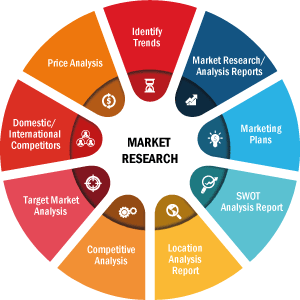Industrial Emission Control Systems Market: Key Insights
Industrial Emission Control Systems are used to control and reduce the release of harmful pollutants into the atmosphere from various industrial processes such as combustion, evaporation, and chemical reactions. These systems are crucial in maintaining air quality and protecting the environment. They are designed to capture, treat and discharge the emissions generated from various industrial activities and ensure that the released pollutants meet the regulations and standards set by environmental protection agencies.
Various industrial emission control systems include scrubbers, catalytic converters, particulate filters, and adsorption systems. The choice of emission control system depends on the type and quantity of pollutants being emitted, the industrial process, and the specific regulations and standards that must be met. As industrial processes continue to expand and evolve, the demand for advanced and efficient industrial emission control systems has increased.
Industrial Emission Control Systems Market
Industrial Emission Control Systems Market Size and Forecasts (2021 - 2031), Global and Regional Share, Trends, and Growth Opportunity Analysis Report Coverage:by Equipment Type (Electrostatic Precipitators, Catalytic Reactors, Fabric Filters, Scrubbers, Others); Emission Source (Power Plants, Chemicals Industry, Cement Industry, Metal Industry, Manufacturing Industry, Others) , and Geography (North America, Europe, Asia Pacific, and South and Central America)
Industrial Emission Control Systems Market Growth 2021-2031
Download Free Sample
Key insights in the industrial emission control systems market include the growing awareness about environmental pollution and its impact on human health, increasing government regulations to control industrial emissions and technological advancements in emission control systems. With the rise in industrial activities and the growing demand for a cleaner and safer environment, the industrial emission control systems market is anticipated to grow in the coming years. Companies working in this market are focusing on developing innovative solutions and technologies to meet the increasing environmental protection and sustainability demand.
Stringent Environmental Regulation Standards to Drive Industrial Emission Control Systems Market
Stringent environmental regulations are a significant driver for the development of the industrial emission control systems market. Governments worldwide are imposing increasingly strict standards to reduce air and water pollution, and companies must comply with these regulations to avoid costly penalties. For example, the European Union has introduced the Industrial Emissions Directive, which requires companies to monitor and control their emissions of harmful substances, such as sulfur dioxide and nitrogen oxides. Implementing such regulations is driving demand for industrial emission control systems, which can help companies meet these standards and reduce their environmental impact.
In addition, companies are recognizing the benefits of reducing emissions, not only to comply with regulations but also to improve their reputation and increase public trust. Many companies are investing in emissions control technologies, such as scrubbers and catalytic converters, to reduce the pollutants they release into the environment. This investment is driving growth in the industrial emission control systems market as companies seek to reduce their environmental impact and meet the expectations of their stakeholders. Overall, stringent environmental regulations and increased corporate responsibility are expected to drive growth in the industrial emission control systems market for the foreseeable future.
Industrial Emission Control Systems Market: Segmental Overview
The global Industrial Emission Control Systems market is segmented on the basis of equipment type, and emission source. Based on equipment type, the market is segmented as electrostatic precipitators, catalytic reactors, fabric filters, scrubbers, others. On the basis of the emission source, the market is segmented into power plants, chemicals industry, cement industry, metal industry, manufacturing industry, and others.
Based on emission source, the metal industry segment held a substantial share in the market. The metal industry is a significant contributor to the growth of the industrial emission control systems market. The high levels of emissions produced by metal production processes, including greenhouse gases and particulate matter, have increased regulations and the need for industrial emission control systems. These systems help the metal industry reduce their emissions to comply with environmental regulations and improve their overall sustainability. As a result, the demand for industrial emission control systems in the metal industry drives growth in the market.
Industrial Emission Control Systems Market: Competitive Landscape and Key Developments
Amec Foster Wheeler, Babcock & Wilcox Co., BASF SE, CECO Environmental Corp, Ducon Technologies Inc., DUSTEX CORPORATION, Fujian Longking Co., Ltd, General Electric Company, Hamon Corporation, and Thermax Ltd. are among the key players operating in the Industrial emission control systems market. These companies have a widespread presence worldwide, which provides lucrative opportunities to serve a large number of customers and expand the market.
Contact Us
Phone: +1-646-491-9876
Email Id: sales@theinsightpartners.com